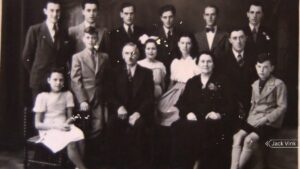Jack Vink (1932)

Born in 1932 in Holland, Jack Vink grew up during a time of immense danger and uncertainty. When the Germans occupied Holland, they systematically rounded up able-bodied men, ages 16 to 50, forcing them onto trains bound for Germany, where they were made to work in factories under brutal conditions.
Jack’s family, determined to resist the Nazis in whatever way they could, adopted clever strategies to avoid suspicion. His mother would strategically place German propaganda—leaflets and pictures of Hitler—on their table to give the impression that they were sympathetic to the occupiers. Despite this, the family had to be vigilant, as the Germans often brought along Dutch-speaking collaborators who could easily expose them. Jack’s mother constantly reminded him to be cautious and never speak in Dutch or ill of the Germans in their presence.
Jack was the youngest in the family and played a crucial role in their survival strategy. Whenever German soldiers came to their home, his eight older brothers would hide in a cleverly concealed trapdoor in the toilet. They would disappear into a hidden space beneath a box, covering it with a carpet nailed down to make it look inconspicuous. Jack would then sit on the toilet, acting as if nothing was amiss. When the soldiers searched the bathroom and saw Jack, they would simply tell him to continue and move on, never suspecting the hiding place just beneath his feet.
Throughout the war, Jack often returned home to find three or four strangers sitting in the living room with small suitcases. It wasn’t until after the war that Jack learned these strangers were Jewish refugees. Under the cover of darkness, his brothers would guide these Jews from house to house, searching for safe places where they could stay until they could secure passage. They often waited on boats destined for England across the treacherous North Sea. However, only small groups could attempt the journey at a time to avoid detection.
One of Jack’s brothers, Hank, undertook an incredibly perilous escape. Along with friends, he paddled a canoe across the North Sea to England, covering about 82 miles to evade capture by the Germans.
The family’s bravery extended even further. They crafted a narrow hiding space within the walls of their home, where Jews could conceal themselves whenever the Germans conducted searches. The space was so tight that those hiding inside could only stand, sometimes for hours on end, until the danger passed.
One tragic story involved a Jewish tailor who, in a desperate bid to save himself, betrayed the locations of fellow Jews to the Nazis. Despite his collaboration, he was eventually captured and never returned.
The heroic actions of Jack Vink’s family and countless others like them stand as a testament to the power of courage and humanity in the face of unimaginable evil. Risking their own lives, they provided sanctuary to those persecuted by the Nazis, helping many Jews escape certain death. The legacy of their bravery lives on, reminding us of the profound impact that individual acts of heroism can have in shaping history. Their story and those of other rescuers continue to inspire and remind us of the enduring capacity for goodness even in the darkest times.
This is an NC HERO post. Part of the North Carolina Holocaust Education, Research, and Outreach Project.
